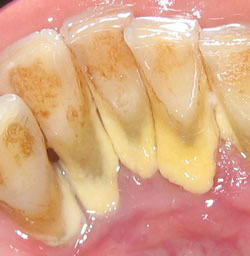
Calculus (tartar)
What is calculus?
Symptoms of calculus
Causes / risk factors for calculus
Prevention / remedies / treatment for calculus
References
What is calculus?
Calculus (tartar) is a form of hardened dental plaque.
Plaque is a soft, colourless biofilm formed by the bacteria in your mouth. The bacteria most responsible for the creation of plaque are Streptococcus mutans and Streptococcus sobrinus. Some of these plaque-forming bacteria, such as Fusobacterium nucleatum, can harm the gums or migrate to other parts of the body where they cause serious ailments such as heart and circulation disease or colon cancer. (2)
Good oral hygiene (regular tooth cleaning and dental flossing), a healthy low-carbohydrate diet and good hydration prevent plaque build-up. It is relatively easy to remove plaque with daily brushing and flossing using the correct technique.

If plaque is not removed and allowed to build up, it tends to harden after a few days and form calculus. Calculus is made from hardened (fossilized) anaerobic bacteria cemented together with calcium phosphate salts from saliva. It binds strongly onto the teeth, and forms a hard cement-like cover with a rough surface. This rough surface provides an ideal medium for further plaque and calculus formation. It usually accumulates around the base of the teeth, under the edges of the gums, and eventually deeper down in the sulcus, the space between the gums and the teeth.
Once tartar forms, it is too hard and firmly attached to remove with a toothbrush. The conventional treatment for tartar removal is by a dentist using ultrasonic tools and specialised sharp instruments to pick it out.
Symptoms of calculus
- Gum disease. It can cause irritated and inflamed gums, gum infection, and receding gums.
- Tooth decay. It provides a base for the further growth of plaque and more tartar, promoting decay.
- Bad breath.
- Anaerobic bacteria that form between the teeth and gums have been linked to cardiovascular disease disease and pre-term low weight babies. (1)
- It stains more easily than tooth enamel, and looks unsightly.
Causes / risk factors for calculus
- Carbohydrates and sugar in your mouth. This comes from eating and drinking sweet, sugary foods, and refined carbohydrates (made with flour, sugar etc).
- Poor dental hygiene. Inadequate brushing or flossing lets bacteria build up between the teeth. See good dental hygiene.
- Dehydration.
- Saliva insufficient flow, dry mouth.
- Calcium deposits, hypercalcemia.
- Smoking.
- Diabetes.
Prevention / remedies / treatment for calculus
- Good dental hygiene. Proper brushing and flossing.
- Diet. Avoid carbohydrates, especially sugar and refined carbohydrates. The diet recommended in Grow Youthful is perfect for dental health and the promotion of good probiotic bacteria in your mouth.
- Sodium bicarbonate. Try to maintain an alkaline environment in your mouth. Calculus / tartar forms under acid conditions. Use sodium bicarbonate as a mouthwash, tooth powder / toothpaste, and to reduce the acidity of any strongly acidic foods or drinks.
- Oil pullling.
- Dental cleaning - your dentist can remove the plaque/calculus/tartar on your teeth and below the gum line.
- See details of remedies recommended by Grow Youthful visitors, and their experience with them.
References
1. Parameter on systemic conditions affected by periodontal diseases.
American Academy of Periodontology. J Periodontal. 2000 May;71(5 Suppl):880-3.
2. Zepeda-Rivera M, Minot SS, Bouzek H, et al.
A distinct Fusobacterium nucleatum clade dominates the colorectal cancer niche.
Nature (2024). https://doi.org/10.1038/s41586-024-07182-w.
